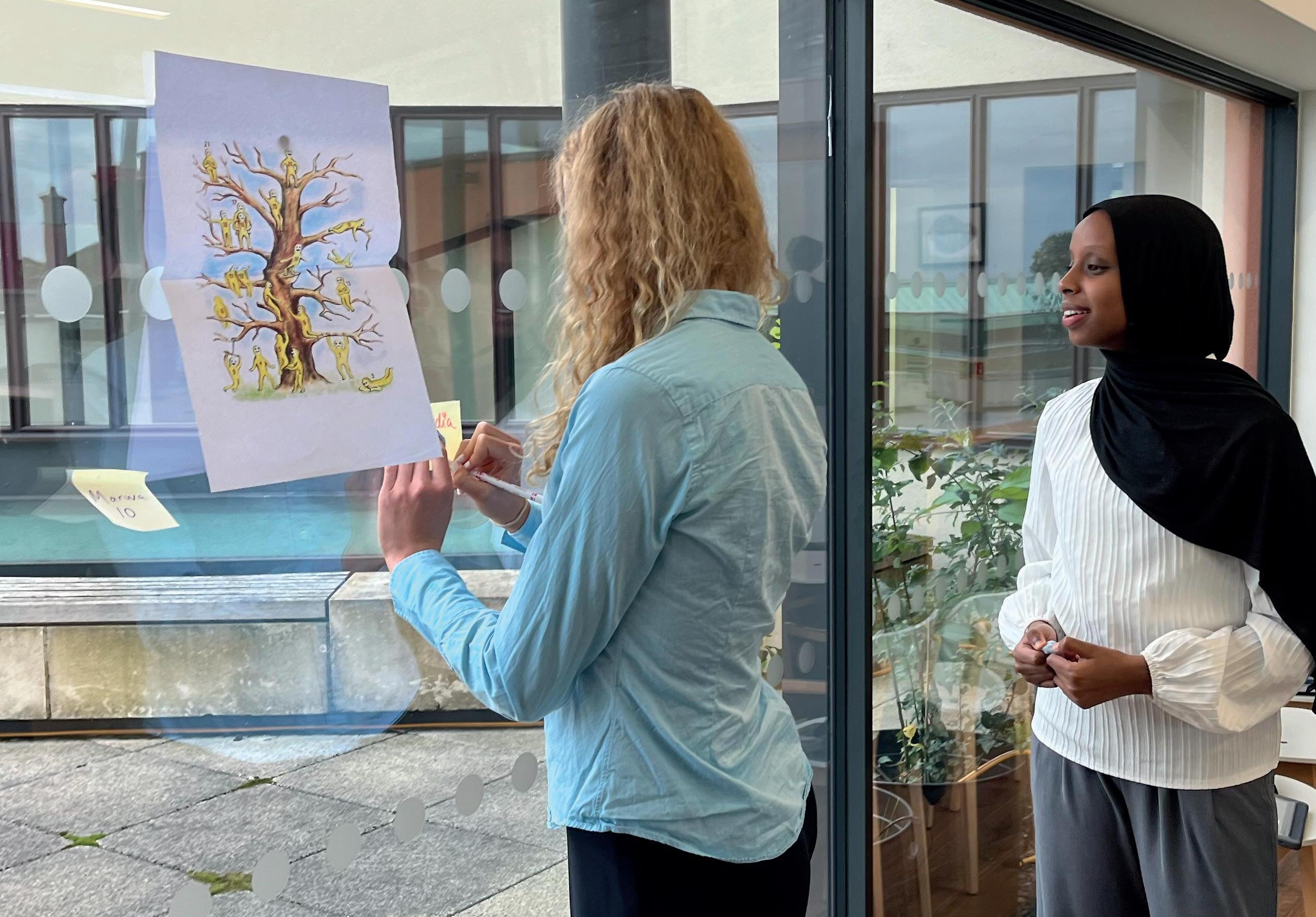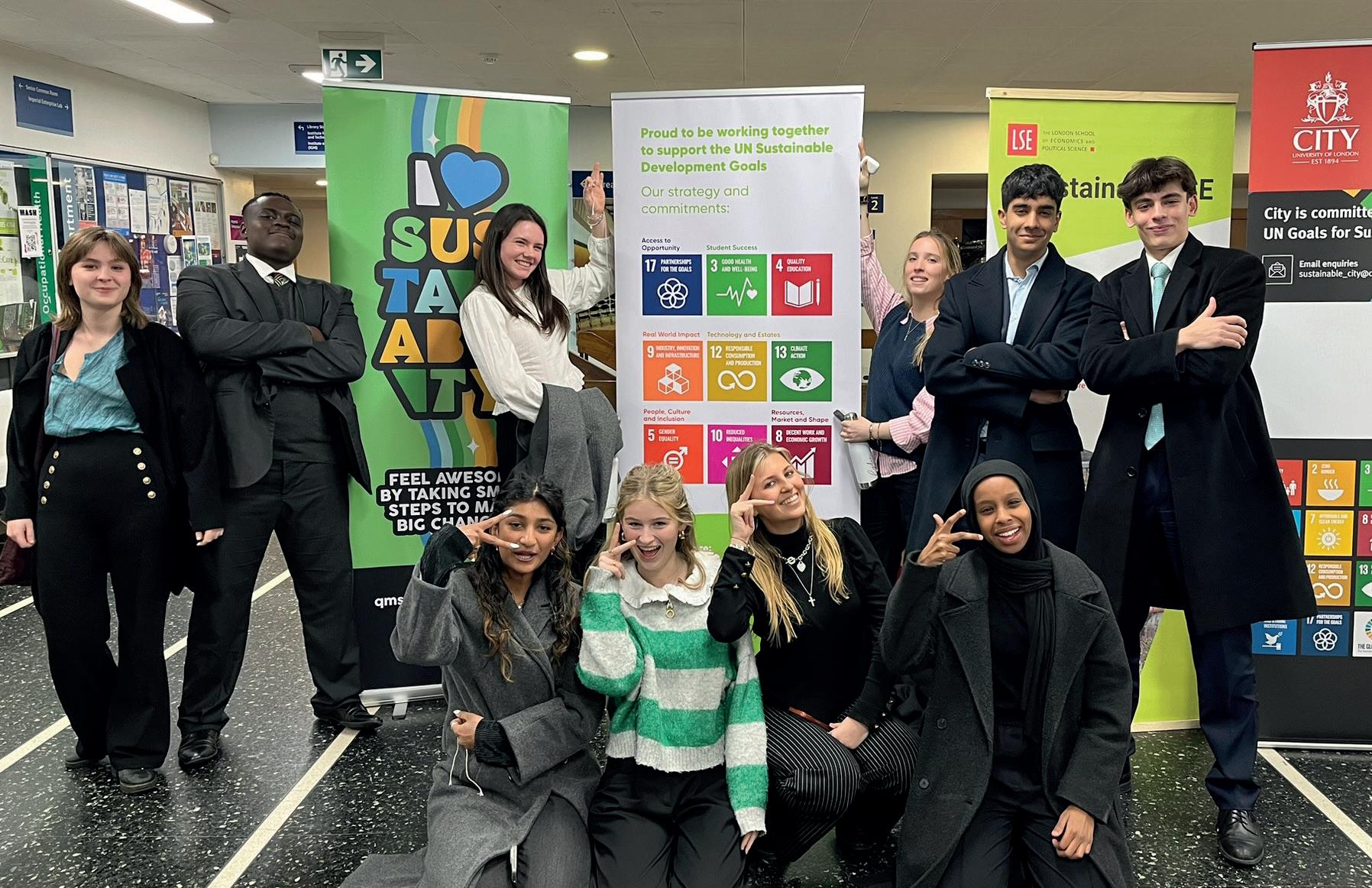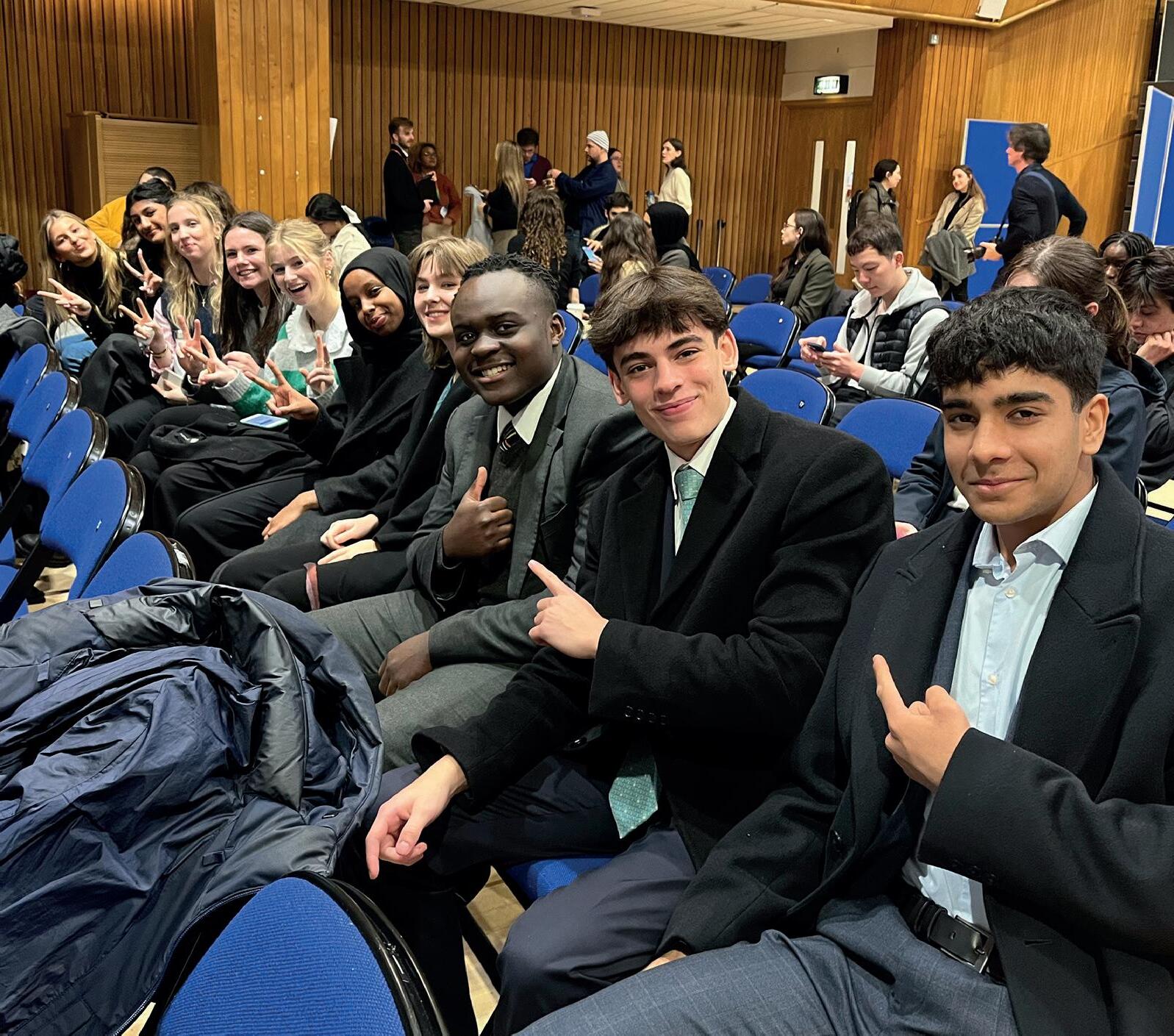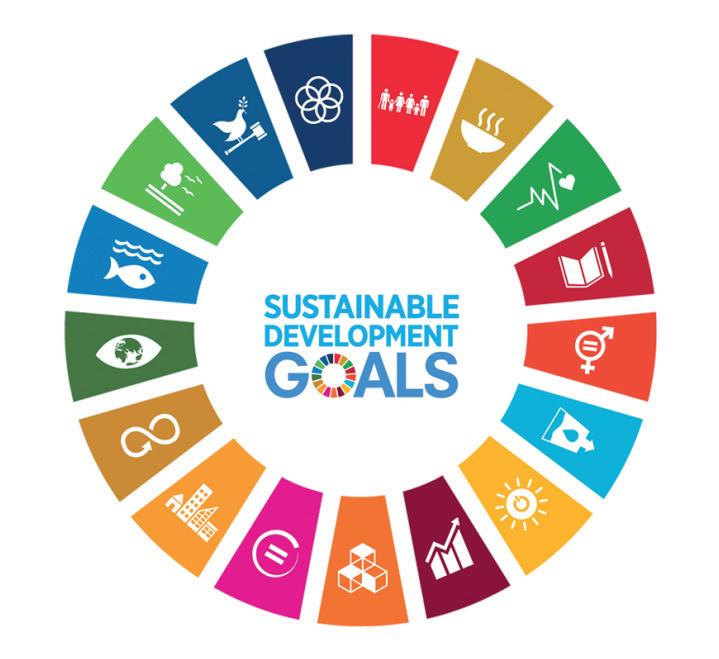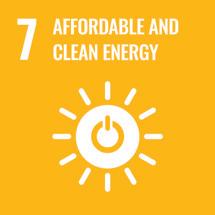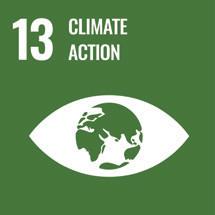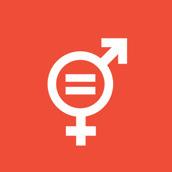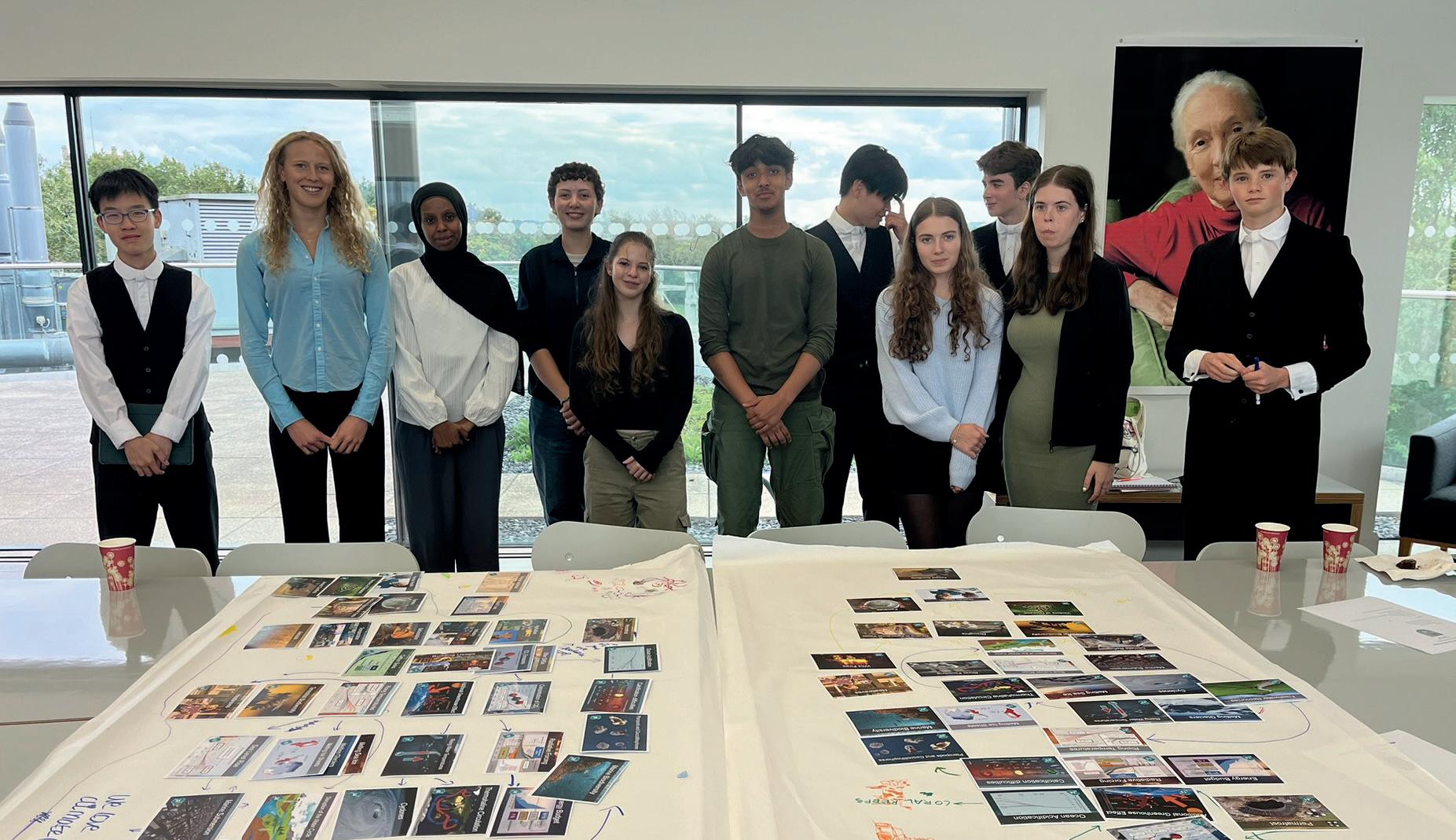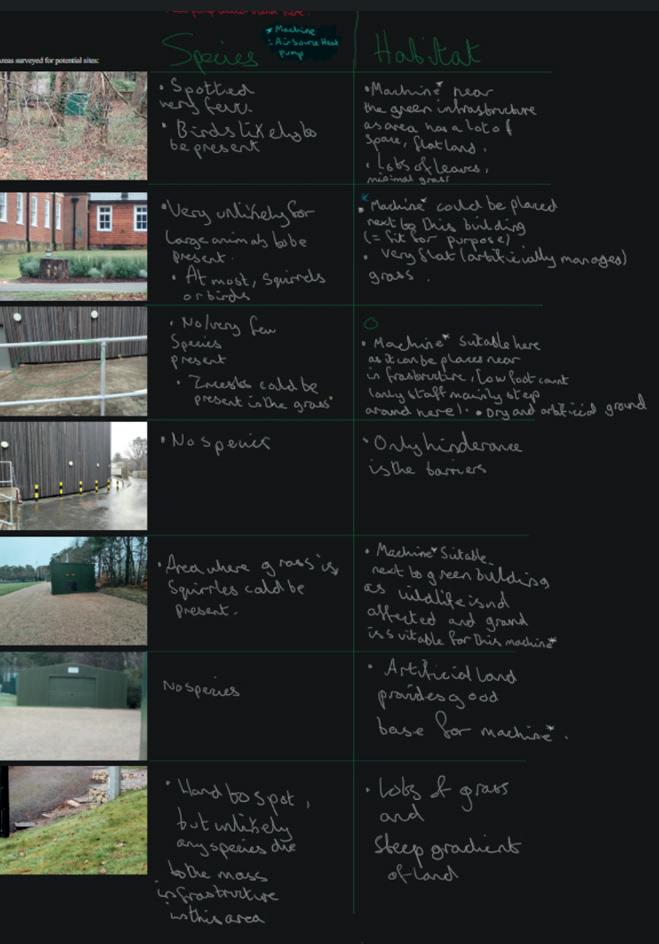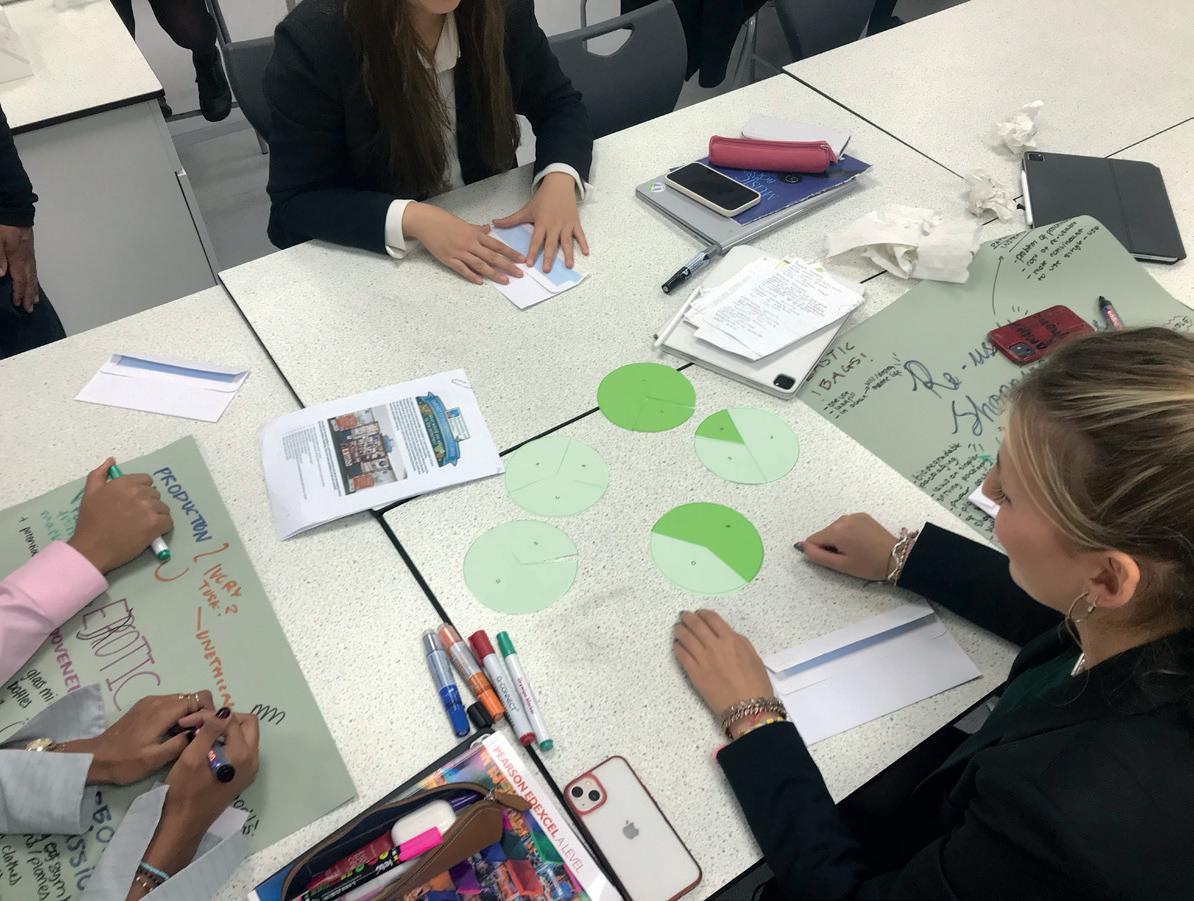Wellington College
Student-led Sustainability and Climate Action Report
Foreword by Ana Romero
Head of Sustainability, Wellington College
This student-led sustainability report represents a major milestone in our collective journey towards a more sustainable future.
As Head of Sustainability at Wellington College, I am proud to witness the dedication of our students to sustainability and climate stewardship. This student-led sustainability report represents a major milestone in our collective journey towards a more sustainable future. Through their hard work, innovation, and commitment, Wellington College students are showing leadership in addressing some of today’s most pressing environmental challenges, while holding themselves accountable and transparent in their actions.
This report builds on the UK Sustainability Framework for Education for Sustainable Development (ESD), which integrates sustainability into education by encouraging students to engage with real-world projects. The framework empowers students by bridging learning and action, positioning them not only as learners but as active contributors to sustainable development. Through practical projects, they connect with their communities, build critical thinking skills, and gain the confidence to play their part in creating a sustainable future.
Wellington College is also proud to be the only UK school recognised for its commitment to the Action for Climate Empowerment (ACE) initiative, which supports individual and community-driven
climate action. By involving students in hands-on climate projects, from student-led committees to collaborations with external organisations, we provide practical experiences that build both skills and confidence. This approach aligns with ACE’s broader mission to empower individuals to act as agents of sustainability and climate solutions, and inspires students to take meaningful, achievable actions to address sustainability and climate change matters.
Additionally, we have integrated intergenerational equity—a principle that underscores the responsibility to future generations—into our teaching practices. Through co-curricular programmes, workshops, and discussions, students are encouraged to consider the longterm impact of their decisions. This approach fosters a sense of responsibility that transcends generations, placing Wellington College at the forefront of sustainability and climate education.
We hope this report serves not only as a reflection of our students’ achievements but also as a share of good practice model for other schools to embrace sustainability and climate action within their educational practices.
PACTS Climate Action Launch at Google Academy: Sustainability Ambassadors Jessy B and Rosie W represented Wellington at the launch of PACTS (Politicians Accountable for Climate to Students), where they discussed their sustainability journeys with leaders including Ann Finlayson, CEO of Our Shared World, and Lord Jim Knight. This new initiative empowers students to influence politicians on climate action through a range of activities, reflecting our commitment to equipping young leaders with the skills to advocate for climate change solutions.
Student-led sustainability and climate action at Wellington College
At Wellington College, we as students are stepping up to make a difference for the planet. This report is entirely student-led, and it is our way of taking a closer look at how we positively impact our community at the college and what we can do to improve it. By gathering and analysing data on sustainability and climate efforts across the college, we are gaining deeper insights into how our actions support the college’s sustainability and climate initiatives.
We want to play an active role in helping Wellington College to make real progress on sustainability and climate. Working together with decision makers and stakeholders from the college, has been a great experience and we are showing that we as students can be part of the solution and have a voice in tackling big issues like climate change.
This report reflects how our projects have given us the chance to learn, reflect, and take action. Our actions are not only oriented to only supporting the college initiatives—it is about creating a culture where we all think more carefully about how we are connecting with nature, how we interact with others and how we treat the planet. We hope this report inspires other children, young people and students to join us in making their schools and community champions in sustainability and climate.
Working in our Priority SDGs
SDG 4: Quality Education
Led by: Marwha Mohamud
1.
Eco-Anxiety pilot lesson
On 21 May 2024, Lower Sixth students at Wellington College, students participated in a pilot 45-minute lesson on Climate Education, with a focus on Climate Anxiety as part of our Wellbeing curriculum. We developed this lesson through careful research and conversations with experts because we wanted to address the emotional and mental effects of climate change in a meaningful way. We believe lessons like this are essential for helping students to manage their concerns around climate change and the environment while building resilience to face the challenges of a changing world.
A survey of 10,000 young people shows that negative feelings about climate change can cause psychological distress.
How are you worried about climate change?
Climate change makes me feel...
• 59% were very or extremely worried and 84% were at least moderately worried
• More than 50% reported each of the following emotions: sad, anxious, angry, powerless, helpless, and guilty.
• More than 45% of respondents said their feelings about climate change negatively affected their daily life and functioning
• 75% said that they think the future is frightening
• 83% said that they think people have failed to take care of the planet.
n=10,000
During the lesson, students participated in a group activity and reflected on how climate change had affected their emotions and mental health. They explored feelings such as fear, anxiety, and sadness, identifying the situations that triggered these emotions. Practical steps to manage climate anxiety were also shared, including:
• Lifestyle changes to reduce their carbon footprint.
• Strategies to stay informed without feeling overwhelmed.
• Personal coping methods like mindfulness.
Students also discussed ways the school and community could provide better support, suggesting initiatives such as counselling services, peer support groups, and community projects that promote a sense of purpose and teamwork.
2. Sustainability venture competition
The Sustainability Venture Competition at Wellington College was recently completed, marking a successful initiative that spanned three weeks. During this period, three Third Form groups engaged in the project, each identifying an issue aligned with a Sustainable Development Goal (SDG) within the College and proposing innovative solutions.
The presentations showcased a range of creative ideas, including suggestions for more wellbeing sessions held outdoors within house year groups, the installation of greenhouses
around the College, the development of a sustainability-focused game by a student, and the implementation of alternative light bulbs that dim based on natural light levels. These projects were evaluated by a panel of judges consisting of Rosie, Lydia, Marwa, Jessy, and Cressida. This competition not only highlighted the students’ ability to think critically about sustainability but also provided valuable insights that can inform future initiatives at Wellington College. An example is available below:
3. Lesson on “My Future Self”
The Wellington College Sustainability Programme is an exciting opportunity for us, as students passionate about sustainability, to learn more about environmental and social issues while actively making a difference in our community. Through lessons, field trips, and hands-on activities, we got to deepen our understanding and undertake meaningful action. One of the highlights of the programme was exploring the grounds of Wellington College, where we connected with the natural environment right here in our school community, gaining a greater appreciation for the local ecosystem.
Jessy and Rosie, members of the Sustainability Committee, were part of the sustainability programme, which brought valuable insights and ideas back to the committee, enriching our ongoing projects and discussions, such as the experience visiting Eagle House to run eco-energy games with younger pupils, inspiring them to think about sustainability in a fun and engaging way. Jessy and Rosie also led a session called “My Future Self,” where we reflected on our dreams and aspirations, considering how we could align them with sustainable practices for the future. The programme also included educational trips to Ali’s Recycling in Berkshire and the Grundon Recycling plant, giving us a close-up look at waste management and recycling processes in action.
Through these activities, the Wellington College Sustainability Programme has not only taught us more about sustainability but also inspired us to undertake meaningful action both within the College and in the wider community.
Recommendations for the next sustainability committee 2024-2025
• Keep Climate Education Going: Work with teachers and decision-makers in the College to develop lessons or a programme on climate anxiety to stay part of the Wellbeing curriculum.
• Start Conversations: Create opportunities for students to openly talk about eco-anxiety, like organising discussion groups or awareness events to break the stigma.
• Offer Peer Support: Set up student-led support groups or buddy systems where people can share their thoughts and coping ideas in a relaxed and friendly space.
• Build a Team Effort: Continue the collaboration with other student committees, like the Wellbeing Committee, to run workshops or events that combine mental health and sustainability goals.
• Stay Connected with Decision-Makers: Keep a regular dialogue with College leaders to share ideas, suggest improvements, and make sure to reduce waste in school.
• Future activities: student voices shape future learning plans that can tackle climate or ecoanxiety.
• Promote Sustainable Action: Lead projects that encourage students to get involved in activities like tree planting, clean-up drives, or campaigns.
• Audit all science practicals at Wellington College to identify and remove unsustainable items or those harmful to wildlife.
• Conduct a thorough review of materials and substances used in science labs.
• Replace harmful items with sustainable alternatives that perform effectively.
• Ensure the safety of the local environment through the implementation of these substitutes.
• Align science teaching practices with the College’s broader sustainability goals.
• Foster a more conscious learning environment that promotes responsible scientific inquiry.
SDG 5: Gender Equality
Led by Rosie Walker
What we did:
1. Gender equality posters
For International Women’s Day, we collaborated with the Equality, Diversity, and Inclusion (EDI) Committee to create a series of posters displayed in the V&A. These posters aimed to raise awareness about the critical role of women in sustainability and the strong connection between gender equality and sustainable development.
The posters highlighted how empowering women and ensuring gender equality are vital for achieving broader sustainability goals, emphasising that inclusive approaches lead to more effective and lasting environmental solutions. This initiative not only celebrated the contributions of women in sustainability but also underscored the importance of gender equality as a fundamental component of sustainable development.
Recommendations for the next sustainability committee 2024-2025
• Collaboration between committees: continue a close collaboration with the EDI committee (and others) in different initiatives as per the following points:
• Joint Assemblies: Collaborate on assemblies to address the intersection of sustainability and inclusion, such as how climate change disproportionately impacts marginalised communities or the role of diverse voices in environmental advocacy.
• Shared Visiting Speaker Programme: Invite speakers who can address both EDI and sustainability topics, such as environmental justice or inclusive approaches to sustainable innovation.
• Combined Events and Campaigns: Organise events celebrating both sustainability and diversity, such as inclusive eco-awareness days that highlight cultural traditions tied to nature and conservation (e.g., Ramadan, Diwali, Lunar New Year).
• Affinity Group Collaboration: Work with affinity groups (LGBTQ+, FemSoc, Cultural Soc) to promote sustainable practices within their initiatives and explore shared goals like reducing environmental harm in underrepresented communities.
• Training and Workshops: Develop workshops for students, staff and community that combine EDI principles with sustainability, such as reducing unconscious bias in environmental decision-making or promoting equitable access to green resources.
• Podcast and Media Projects: Co-produce podcasts or videos that explore topics like sustainable development through an EDI lens, featuring student voices from both committees.
SDG 7: Affordable and Clean Energy
Led by Jessy Banzoulou
What we did:
1.
Eco-Games at Wellington College
On Monday, 22nd April, we celebrated Earth Week at Wellington College with an exciting Eco-Games tournament. This was a brilliant house competition where teams of up to 12 students from each house took part in a range of eco-themed games. It was an amazing way to promote environmental awareness and sustainability while having a bit of friendly competition. The winning house was announced the next day, 23rd April, and they got to enjoy a well-earned pizza night, kindly sponsored by our Sustainability Committee. The event was not just about having fun—it brought us together as a community and got us thinking in creative ways about how we can make a difference.
One of the highlights of the Eco-Games was the pledges. Each team had to come up with a sustainability pledge as part of their commitment to environmental action. Some of the ideas were really clever, like:
• Take the walking bus
• Lids on pans
• Eco-drive
• Go by coach
• Quick shower
• Turn the tap off
• Ditch the disposable
• Re-fashion fashion
• Ditch the car
• Don’t overheat water
• Plastics not fantastic
During Earth Week, our Sustainability Committee also held an assembly where we shared what we have been doing to make Wellington College more sustainable. Afterwards, we hosted a fireside talk with Dr Omnia El Omrani on youth climate action, which was inspiring and made us feel that we really can make a difference. It was a week full of energy, ideas, and action that showed how much we can achieve when we work together
Recommendations for the next sustainability committee 2024-2025
• Run Another Eco-Tournament: Organise a second Eco-Games tournament during Earth Week, engaging all houses in ecothemed challenges.
• Expand the Eco-Tournament to Partner Schools: propose to the Berkshire Schools Eco-Network to organise an inter-school EcoTournament with the aim to share ideas and best practices.
• Advance the Air Source Heat Pump Project: Review the findings from this year’s pilot study and explore scaling up installations with decision-makers.
• Strengthen Partnerships and Stakeholder Engagement: Work closely with the College’s leadership and external organisations to expand opportunities for renewable energy projects and sustainability initiatives.
• Plan Earth Week Events with Greater Impact: Introduce interactive sessions, such as fireside talks or panels with sustainability experts, similar to this year’s event with Dr Omnia El Omrani.
some draft
Below are
notes made by student Jessy Banzoulou as part of this project:
SDG 12: Responsible Consumption and Production Lead: Sophia Boyce
What we did:
1. Reducing paper usage and wastage in the chapel: Students Jessy, Cressida, Nayan and Harriet met with Father Adrian to discuss ways to cut down on paper usage in the chapel. “We considered several options, including installing a screen in the chapel, creating an e-booklet accessible on phones, or using a hymn-book format. Ultimately, we decided on a solution involving a durable, reusable booklet for general use, along with a small, service-specific piece of paper for each service. These changes will be implemented from September 2024.”
2. Each house getting its own food waste bin: During a visit to the boarding houses, we noticed that some houses did not have food waste bins. “To address this issue, we decided to provide each house with its own bin. We also needed to organise a system for transporting food waste from each house to a central bin. This involved planning the logistics to ensure that the bins were placed appropriately and that there was a reliable method for collecting and transporting the waste. Everything has been agreed by Mr Heffer, General Services Manager – Domestics, and we are now moving onto the planning and implementation stage of this initiative.”
3. Maya’s Refillables:
“We believe it is crucial to minimise the use of single-use plastics in our communities wherever possible”. To support this goal, we identified a local business, Maya’s Refillables—a zero-waste shop in Wokingham, Berkshire—that promotes sustainable living by offering refillable household products like laundry detergent. Their approach reduces reliance on single-use plastic packaging and encourages eco-friendly habits. We have initiated discussions with them and Mr Heffer to collaborate with Hardinge House on a trial programme, where laundry detergent containers can be refilled, helping to eliminate single-use plastics in this area.
Recommendations for the next sustainability committee 2024-2025
• Follow Up on Chapel Paper Usage Reduction: monitor the implementation of the reusable booklet system and service-specific paper sheets in the chapel from September 2024. It could be helpful as well to explore further opportunities to reduce paper use in other areas of the College.
• Expand Food Waste Bin Initiative: oversee the rollout of food waste bins in all boarding houses, ensuring the agreed logistics are in place for collection and transport. In a second phase it will be important to organise educational sessions or campaigns within houses to promote proper use of food waste bins and minimise contamination. And finally, an evaluation of the effectiveness of the system by tracking food waste reduction and identifying areas for improvement will be very important to know how successful this project is.
• Progressive elimination of single-use plastics: work with Hardinge House to run the trial programme with Maya’s Refillables for laundry detergent refills, trying to gather data on participation rates and single-use plastic reductions. Promote the stich from paper to rice straws in the V&A and look into alternatives to eliminate plastic water bottles from packed lunches.
• Promote active learning: organise sustainability workshops for students and staff, focusing on responsible consumption habits and reducing waste.
SDG 13: Climate Action
Led by Marco Martin Martines and Lydia Compton-Burnett
What we did:
1. Wellington College Estates - Sustainability Action Plan:
We contacted the Group Estates Bursar Mr Wai to better understand what Wellington College are doing to enhance sustainability in the campus. This enables us to stay informed with the College’s sustainability updates and make sure that with our actions and student-led initiatives are aligned with the school-wide action plan and can contribute to it. Key details of such plan are:
Objective: Achieve net zero emissions (Scope 1 and 2) by 2050, or earlier.
• College Transport Fleet: Transitioning from petrol and diesel to electric vehicles, with 17 electric vehicles now making up 30% of the fleet.
• Solar PV: Installation of 8 systems, with a total capacity of 300 kWp.
• Ground Source Heat Pump: A new system with a 300-kW heat capacity is set to be completed this year.
• Thermal Enhancements: Implementing upgrades such as roof insulation, double glazing, and cavity wall insulation.
• Boiler Replacements: Replacing old, inefficient boilers with high-efficiency models.
• Energy Management: Improving the Building Management System to achieve 95% coverage across the campus.
• EV Charging Infrastructure: Expanding electric vehicle charging points across the estate.
• Smart Meters: Installing smart meters in domestic properties to better manage energy usage.
This College strategy is focused on modernising infrastructure, improving energy efficiency, and adopting renewable energy solutions to significantly reduce carbon emissions and achieve net zero targets.
Recommendations for the next sustainability committee 2024-2025
• Host Climate Fresk Workshops: organise interactive workshops to educate students and staff about climate change science, integrating them into events like Earth Week or the curriculum.
• Deliver Carbon Literacy Training: use activities like the Bananas Game to teach the community about carbon footprints and certify participants as “Carbon Literate.”
• Continue the participation at the PACTS initiative: advocate for stronger climate education by joining the Politicians Accountable for Climate Education (PACTS) initiative and engaging with policymakers.
• Implement the Carbon Zero Schools Programme: implement the Carbon Zero Schools Programme from which Wellington College is member to set and track goals for reducing the College’s carbon emissions from the view of students.
• Create Peer-Led Climate Education: train students to deliver practical, action-oriented climate education sessions in houses or assemblies.
• Collaborate on Local Climate Projects: identify local organisations for impactful community initiatives such as CROW.
• Update the Student Sustainability and Climate Action Plan: to continue with the good work and the efforts done by previous sustainability committees, it will be important to update this central document that will continue to establish goals, collaborations and leadership to implement and monitor progress of students led actions.
• Run Awareness Campaigns: organise events and campaigns, such as “Climate Action Week,” to inspire the community and highlight sustainability efforts.
